Share
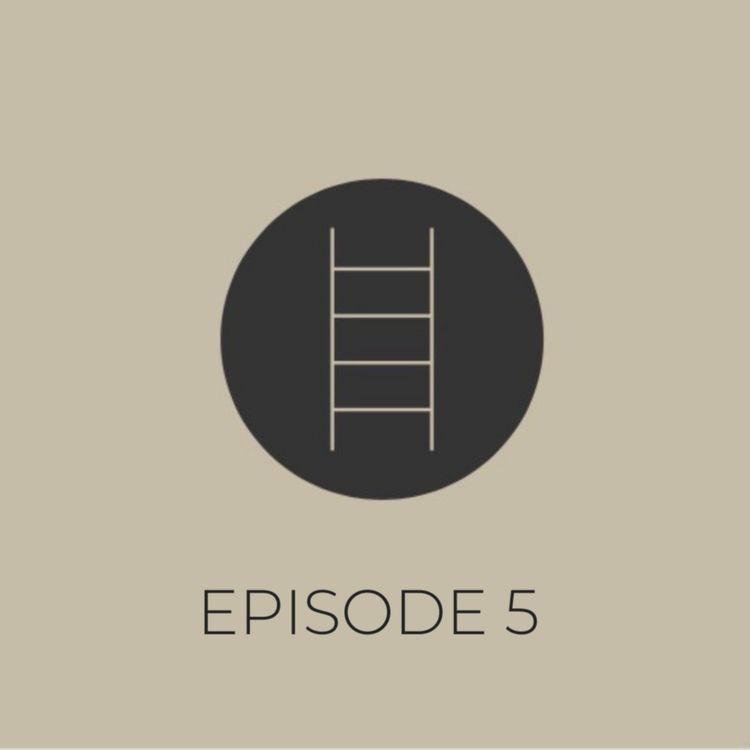
Holding Up The Ladder
Dr Lemah Bonnick
This is the 3rd and final instalment on the series of discussions on race, class and education in the UK. It only felt right to interview the person who is the reason I am who I am, who has shaped the way I see the world - the person who literally brought me into the world, my mother, sociologist Dr Lemah Bonnick.
Bio
Lemah trained at the Institute of Education where she obtained her PhD in the Sociology of Education ‘Racial structuring of Educational Marginality’.
She was a senior lecturer in sociology at St Mary’s University: Twickenham. She also served as a school governor. She has presented her work in the United States - at Temple University, Ohio State University and Brown - In the Service of Neglected People: Anna Julia Cooper, Ontology, and Education
She is currently working on a book - The Will to Know: Redemptive Tradition in the
Struggle for Education among People of African Descent in America and the
English-Speaking Caribbean
We talk about her journey into Sociology working with Dr Basil Bernstein considered one of the architects of the Sociology of Education. We talk about class as a component of social, cultural and economic capital and its impact on education and what my mother describes as the ‘commodification of education’.
We talk about Caribbean intellectuals and their contribution to shaping discussions around Britain’s colonial legacy in the UK and the Caribbean - C.L.R. James, Stuart Hall, educational psychologist Bernard Coard, Jessica Huntley, New Beacon books founder, John La Rose, Kamau Braithwaite. We talk James Baldwin, Toni Morrisson, W.E.B Dubois, Anna Julia Cooper. We talk about Windrush, about the complex relationships between minority groups. We talk about the controversial UK report on race by the Commission on Race and Ethnic Disparities and we talk about music.
Guest: Dr Lemah Bonnick
Title: We talk about the exception as if it’s the rule
Artists on playlist: Marvin Gaye, Schubert, Ella Fitzgerald and Lionel Richie
Links:
Bernard Coard - How the West Indian Child is Made Educationally Sub-normal in the British School System: The Scandal of the Black Child in Schools in Britain
John La Rose, New Beacon Books
Windrush - https://www.bl.uk/windrush
https://www.bbc.co.uk/news/uk-43782241
Akala - Natives: Race & Class in the Ruins of Empire
Learn more about our Season 3 sponsors Airbnb and Project Lighthouse
More episodes
View all episodes
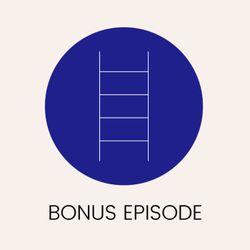
It’s your job to make the work
01:01:18||Season 4Welcome to a special live episode of Holding up the Ladder in collaboration with The Royal College of Art. feat. Gülce Tulçalı and Phoebe Davies.As part of the Royal College of Art (RCA) MA graduate students', 'Curating Contemporary Art Exhibition' and their curatorial show, Feed Back, I was invited to lead a discussion exploring remediating legacies, curatorial repair and the role of artistic practice in defining and potentially shaping new legacies. Our conversation took place in the Hanger space at the RCA, an open concrete and brick exhibition space with numerous MA students assembling their curatorial shows. So during our conversation expect to hear the hive like activity of a space in preparation.The curatorial team responsible for Feed Back were: Apoorva Subbanna, Yi Fan, Serena Gao, Francesca Inciong, Stephanie Rubio, Arina Baburskova and Indy CallandIn conversation were artists: Gülce Tulçalı & Phoebe DaviesWe talk about dystopian realities, about the body, about making, about the artist’s role responding to the world around us. We talk about tenant farming and about collectivity and the commons.Gülce Tulçalı Bio Phoebe Davies BioLinksNow, The Invisible CommitteeOctavia's BroodVandana Shiva, Reclaiming The CommonsSlade Farm Organics & PodcastTitle: It's Your Job to Make the Work - A Holding Up The Ladder production in collaboration with RCA feat. Gülce Tulçalı and Phoebe Davies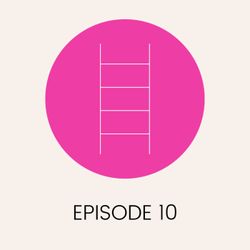
19. Zadie Smith & Devonté Hynes
01:24:52||Season 4, Ep. 19I can’t think of a better way to end season 4 and the never before heard conversations from my archive, than my conversation between friends, Zadie Smith and Devonté Hynes. I’d been badgering Zadie for a while to let me interview her and when she agreed, the day before our conversation was scheduled, she emailed to ask if she could bring her friend Dev? I of course said yes, scrambled to find another microphone and when we had a last minute cancellation of the recording venue, we had to do it at my house. And the room with the best soundproofing, my bedroom!We talk about how we’re all storytellers; about music; about the power of live music; about the myth of the 10,000 hours; about Prince; about whether we should define ourselves as 'artists'; about authenticity and consciousness; about knowing and unknowing and about being students forever. I’ve produced almost 60 podcast episodes and this is one of my favourites. Because, for me, there is nothing more fulfilling than sitting around with creative people talking about music and making and process - it’s why this podcast exists. I hope you enjoy it as much as I do.Guests: Zadie Smith & Devonté HynesTitle: I would never call myself an artistMusic: Lil Nas X, Industry Baby; Arctic Monkeys, There'd Better Be a Mirrorball; Maggie Rogers, That's Where I Am; Knucks, Alpha HouseLinksDevonté Hynes IG and WebsiteZadie Smith WebsiteZadie interview on latest book, The Fraud - BBC Sounds, This Cultural LifeFind out ways to support the Israel-Palestine project click herePodcast WebsitePodcast IG
18. I've been thinking about...friendship (Pt 2)
08:14||Season 4, Ep. 18Welcome to part 2 of I've been thinking about...friendship. I talk about the importance of friendship and how pivotal it's been in my creative practice. Holding up the Ladder links:Find out ways to support the Israel-Palestine project click herePodcast WebsitePodcast IG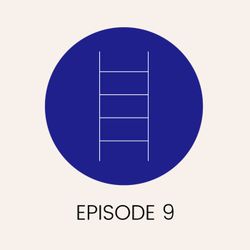
17. Francis Fuster (Pt 2)
42:02||Season 4, Ep. 17Welcome back to part 2 of my conversation with Francis Fuster. We pick up our conversation in London in the 1980's. Francis is playing percussion for Hugh Masekela, he's touring with Paul Simon and that huge record, Graceland. We talk about playing in South Africa post apartheid and a short stint in jail - it was self-defense! Guest: Francis FusterTitle: You gotta be readyMusic: Bach, Handel, Miles Davis and John ColtraneMusic linksHugh Masekela, SekunjaloGeraldo Pino and the Heartbeats, Maria Lef for WakaHugh Masekela, Don't go lose it babyHugh Masekela, Bring Him Back Home (Nelson Mandela)Francis Fuster, NajesuehOther linksShango-Ja Martial Arts AcademyFind out ways to support the Israel-Palestine project click herePodcast WebsitePodcast IG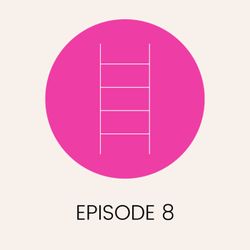
16. Francis Fuster (Pt 1)
52:29||Season 4, Ep. 16You’re in for a treat today! And a little interruption from conversations from my archive. I recently did a gig at London’s Jazz Cafe playing keys and singing for a special concert in honour of South Africa Freedom Day and the late great South African trumpeter, Hugh Masekela. The person leading the band was his percussionist and friend of nearly 50 years, Francis Fuster.Born in Sierra Leone to a Liberian mother and Swiss father. Now 81 (but looks more like a man in his 60's!) a 7th Dan black belt in karate, upright and sharp as a tack. We talk about his journey from dancing, to drumming, to teaching, to percussion. About being a member of the band described as the Beatles of Africa, Gerald Pino and The Heartbeats.We talk about his close friendship with icon and disruptor musician Fela Kuti, also the reason he started learning karate. How he went from Sierra Leone to Liberia, to Ivory Coast, to Ghana, to Nigeria, ending up in New York and the wildness of that period. We talk about playing with Paul Simon and the huge record that was Graceland. And his close professional and personal relationship with Hugh Masekela.This was a joyous interview (what was meant to be an hour long conversation, was closer to 2!) So it's divided into 2 parts.Guest: Francis FusterTitle: You gotta be readyMusic: Bach, Handel, Miles Davis and John ColtraneMusic linksGeraldo Pino and the Heartbeats, Maria Lef for WakaHugh Masekela, Don't go lose it babyHugh Masekela, Bring Him Back Home (Nelson Mandela)Francis Fuster, NajesuehOther linksShango-Ja Martial Arts AcademyFind out ways to support the Israel-Palestine project click herePodcast WebsitePodcast IG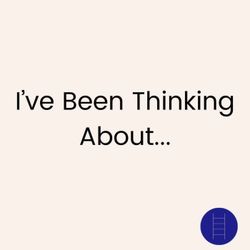
15. I've been thinking about...friendship (pt 1)
09:13||Season 4, Ep. 15Today's episode of 'I've been thinking about' is a 2-parter and it's all about friendship and how it has impacted my practice. We talk about how much our families impact our lives, but not so much our friendships. Yet since we choose our friendships they are deeply significant - I explore why.Holding up the Ladder links:Find out ways to support the Israel-Palestine project click herePodcast WebsitePodcast IG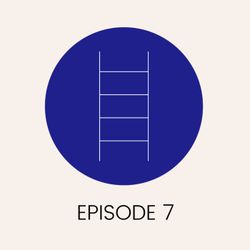
14. Rich Harless (Pt 2)
40:38||Season 4, Ep. 14Welcome back to the 2nd part of my conversation with Rich Harless. We caught up last month, and kick off our convo talking about how NFTs are no longer the hot topic, but the shift is to AI. And for context, the 2 artists Rich refers to are Sam Ryder who was runner up on the Eurovision song contest and Marc Rebillet who performs in the street.And if you haven't done so already, I recommend listening to Part 1 to get a full picture.Guest: Rich HarlessTitle: It’s like skywriting in a hurricaneMusic: Depeche Mode, David Bowie, Purple Disco MachineLinks:Rich Harless on LinkedinFeather agencyFind out ways to support the Israel-Palestine project click herePodcast WebsitePodcast IG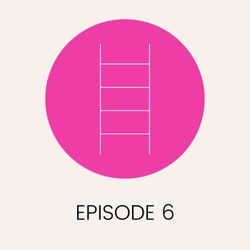
13. Rich Harless (Pt 1)
58:54||Season 4, Ep. 13In this week's episode we’re talking tech, marketing, AI and the music industry with entrepreneur, Rich Harless.Rich Harless is a Berlin-based, US-born entrepreneur and the founder of Feather, a company pioneering AI-powered brand measurement for digital advertisers. Prior to launching Feather, Rich held leadership roles at leading music and media companies such as AOL, Shazam, and Digitalstage.io, where he collaborated with some of the world’s largest streaming platforms, record labels, and a diverse range of independent artists. With over two decades of experience across digital advertising, emerging technology, and the creative industries, Rich has worked at the intersection of AI, blockchain, and augmented reality, helping brands and media platforms navigate technological shifts.We talk about old vs. new music; the disconnect between art and business; about streaming platforms. The role of social media for independent artists, as Rich says it’s good for discovery but not for monetisation.And because this is a never before heard conversation from my archive and the tech space changes so rapidly, Rich very kindly came back on the pod to chat with me about what he’s up to now and the latest changes in the tech space. For example, the first time we spoke it was centred around web 3 and NFTs and now the focus has shifted to AI. I decided to keep it in, because Rich explains things so clearly it helps provide a kind of technological arc, so to speak, to understand where things are at now. So this is a 2-parter. Tune in next week Wednesday to hear the follow-up conversation we had just last month.Guest: Rich HarlessTitle: It’s like skywriting in a hurricaneMusic: Depeche Mode, David Bowie, Purple Disco MachineLinks:Rich Harless on LinkedinFeather agencyTed Gioia - Is Old Music Killing New Music?Find out ways to support the Israel-Palestine project click herePodcast WebsitePodcast IG
12. I've been thinking about...maturity, ageing - the process produces the sound
17:58||Season 4, Ep. 12What makes an artist great, how does an artist become great? In today's episode of I've been thinking about, I explore the idea of maturity, ageing and process.It seems to me that maturity, ageing in the Arts is actually beneficial. Unlike other professions where ageing is synonymous with decline, with cognitive or physical impairment - people in sports have an early retirement age for that reason, Or former US president Biden wasn’t he forced to step down because of his cognitive decline due to his age? That doesn’t seem to apply to artists. When it comes to the Arts, age and maturity actually have the opposite effect - we can keep getting better. And there are many examples of this: Irish writer Edna O’Brien lived to 93. French writer Annie Ernaux now 84, won the Nobel prize for literature at the age of 82. Classical pianists only seem to get better with age, they have all the technique of years of practice without the need for showmanship that you sometimes see in younger pianists. I think about artists like Sonia Boyce who represented Britain at the Venice Biennale in her 60s or figurative painter Claudette Johnson also in her 60s. What about American abstract painter Stanley Whitney still making beautiful work at 79 or Indian artist, Arpita Singh. Now 87, I recently went to her solo exhibition at London’s Serpentine and her work took my breath away, her use of colour and composition, I felt like I was seeing an entirely new interpretation of artistic expression.I mean as long as you can pick up a paintbrush or pencil, or a camera, the work doesn’t and shouldn’t stop. And I’m not saying that we have to wait until we’re in our 80s to produce works that’s meaningful. I’m saying that our process produces the sound and the deeper the process the richer the sound. Music Refs:Ray LaMontagne, JoleneJoni Mitchell, Both Sides Now from 1969Joni Mitchell, Both Sides Now from 2000 Holding up the Ladder links:Find out ways to support the Israel-Palestine project click herePodcast WebsitePodcast IG